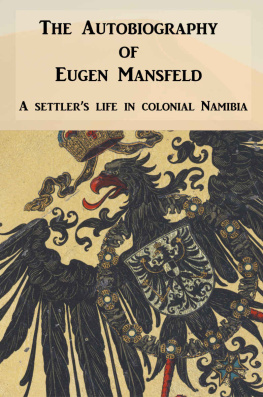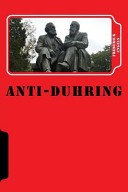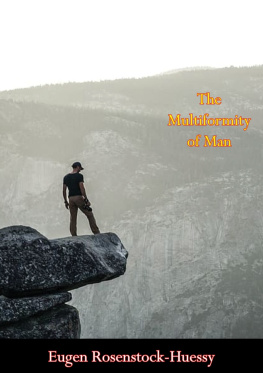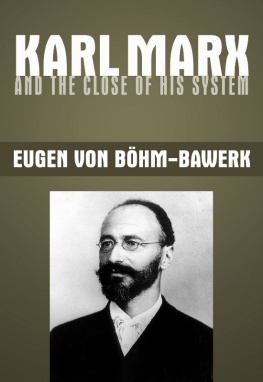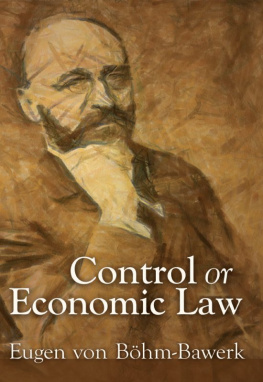Eugen Mansfeld - The Autobiography of Eugen Mansfeld: A German settler’s life in colonial Namibia
Here you can read online Eugen Mansfeld - The Autobiography of Eugen Mansfeld: A German settler’s life in colonial Namibia full text of the book (entire story) in english for free. Download pdf and epub, get meaning, cover and reviews about this ebook. year: 2017, publisher: Jeppestown Press, genre: Non-fiction / History. Description of the work, (preface) as well as reviews are available. Best literature library LitArk.com created for fans of good reading and offers a wide selection of genres:
Romance novel
Science fiction
Adventure
Detective
Science
History
Home and family
Prose
Art
Politics
Computer
Non-fiction
Religion
Business
Children
Humor
Choose a favorite category and find really read worthwhile books. Enjoy immersion in the world of imagination, feel the emotions of the characters or learn something new for yourself, make an fascinating discovery.
- Book:The Autobiography of Eugen Mansfeld: A German settler’s life in colonial Namibia
- Author:
- Publisher:Jeppestown Press
- Genre:
- Year:2017
- Rating:3 / 5
- Favourites:Add to favourites
- Your mark:
- 60
- 1
- 2
- 3
- 4
- 5
The Autobiography of Eugen Mansfeld: A German settler’s life in colonial Namibia: summary, description and annotation
We offer to read an annotation, description, summary or preface (depends on what the author of the book "The Autobiography of Eugen Mansfeld: A German settler’s life in colonial Namibia" wrote himself). If you haven't found the necessary information about the book — write in the comments, we will try to find it.
Eugen Mansfeld: author's other books
Who wrote The Autobiography of Eugen Mansfeld: A German settler’s life in colonial Namibia? Find out the surname, the name of the author of the book and a list of all author's works by series.
The Autobiography of Eugen Mansfeld: A German settler’s life in colonial Namibia — read online for free the complete book (whole text) full work
Below is the text of the book, divided by pages. System saving the place of the last page read, allows you to conveniently read the book "The Autobiography of Eugen Mansfeld: A German settler’s life in colonial Namibia" online for free, without having to search again every time where you left off. Put a bookmark, and you can go to the page where you finished reading at any time.
Font size:
Interval:
Bookmark:
The Autobiography
of Eugen Mansfeld
A German settlers life in colonial Namibia
Translated by Will Sellick

In the summer of 1942 Eugen Mansfeld, then aged 71 and living with his daughter-in-law in Cape Town, painstakingly typed out his autobiography; in German, double-spaced on 179 pages of lined paper. He pasted in some family photographs, drew some maps by hand with a fine mapping pen, then bound it all in a hardboard folder and apparently never looked at it again. The original documenta together with Mansfelds dress sword and war medals, and several folders filled with original documents relating to the Mansfeld familyis in the collection of Dr Nigel McLean of Johannesburg, South Africa.
Mansfeld was a participant in many key events in colonial-era Namibian history. As an early German colonist and employeelater deputy directorof the Deutsche Kolonial Gesellschaft fr Sd West Afrika (DKG) he was directly involved in the process of appropriation of Namibian land from the people who lived there. He fought against the Herero uprising, issued licences to white diamond prospectors in the early 1900s, and mobilised against British and South African forces as an officer in the Schutztruppe Reserve during the First World War.
It is clear from the content and the differing styles within the account that in writing it, Mansfeld drew on other personal, contemporaneous sources: his accounts of the Herero uprising and the First World War are obviously straight transcriptions, more or less, from his original diaries written in the field.
Mansfelds eventual intention was that his sons should read this book after his death, and a large part of its historical value comes directly from it being a gossipy, informal account by a man writing for his family, not a carefully-considered work for publication or eventual public dissemination. The account makes for a brutal, distressing and uncomfortable read at times (Dr Martha Akawa, a historian at the University of Namibia, describes it as stomach-churning, adding that it is emotionally draining and plainly upsetting and distressing.) Constant racism and anti-Semitism; accounts of hanging black combatants during the Herero uprising; a detailed description of how his men set fire to the church and houses of the people of Barmen and the village of Okamita; burning the possessions of a group of Bushmen because Mansfeld believed they had stolen his horses. In one gruesome passage Mansfeld gives a matter-of-fact account of robbing a grave in order to obtain an old mans skull as a souvenir, later boiling the flesh off the skull in the farmhouse kitchen at Spitzkopje and causing Mansfelds housekeeper to leave in disgust.
First-person accounts of Namibias complex history are few and far between; this work helps to fill some of the gaps in our understanding of the story of this region of southern Africa. Ultimately the value of Mansfelds autobiography lies in the new light it enables historians to cast on Namibias early colonial-era history: in the words of President Hage Geingob, gathering and preserving the different eras in history that shaped Namibia into the country it is today.
My sincere thanks to Christine Leist for her assistance with some particularly idiomatic nineteenth-century German slang phrases; to the Namibian historian Theophelus Gurirab for his assistance in identifying Mansfelds housekeeper; and to Jan-Bart Gewald for his thoughtful and encouraging suggestions. All translation errors are my own.
Will Sellick
June 2017
I have set down the following notes containing an account of my life for my sons, so that after my death they know the story of their fathers gypsy life.
I will briefly go over my early youth; it was not all sunny, and my children have had a happier and more loving childhood than I did.
I was born on 1 April 1871 in Tetschen an der Elbe (Bohemia), which was then a proper German provincial town with a population of about 5,000; the second son of Carl Mansfeld, a businessman and Prussian citizen. I lived with my four brothers under the tender care of my parents until my tenth year. Following four years at school in Tetschen, I joined my elder brother Alfred in Dresden both at the Neustdter Gymnasium there; and at the austere boarding-house of retired Grenadier-Feldwebel Frster, which was run along strictly military lines. After completing a three-year course at the Dresden Higher Business School, on 1 April 1888 I became an apprentice in the office of the Cretuznach & Scheller textile spinning mill, subsequently completing a two-year apprenticeship, and about a year as a clerk. As part of getting to know the technical spinning operation, for a year I was active in the factory from six to nine in the morning, becoming a master spinner, and acquiring engineering knowledge that would prove useful in later years.
On 1 April 1891 I signed up for one year as a volunteer in the Schtzen-Fsilier-Regiment Nr. 108 ; I became a Gefreiter on 1 October 1891, and was promoted to Unteroffizier on 1 January 1892. Shortly after my discharge at the end of March 1892, I got a position at the wool merchants Wilkens & Co. in Antwerp; I used a two-month vacation in 1894 to undertake a one-week military exercise with my regiment, and, promoted to Vice-Feldwebel , returned to my firm for another year.
These three years in Antwerp counted as the happiest and most carefree of my life. I had a bunch of good friends in Antwerps German community, and by working hard during my spare time I learned to speak French perfectly; I also spent many happy hours with Walloon and Flemish families. To describe everything would fill a book by itself: looking back, it is probably better if the many stupid pranks we played stay unrecorded.
In March 1895 I returned to Germany to carry out my two eight-weekly Reserve exercises, back with the Schtzen-Fsilier-Regiment , travelling around in Germany and Austria and participating for a short while in my fathers business. But Germany did not attract me: Antwerp was my first taste of a foreign country, and now I felt compelled to travel further afield.
During these military exercises I already carried around references from my boss in Antwerp, Herr Wilkens; and I had applied for positions in Buenos Aires, Montevideo, Sydney and South Africa. I had already had a job offer from Montevideo, which I declined because of the low salary, but I accepted an offer from the firm of Malcomess & Company, in East London in South Africa, as an assistant wool buyer, and I gave notice to Wilkens.
The choice was free passage and a three-year contract; or travel at my own expense, with no contract and one months mutual notice. Three years is a long time, I said to myself; you might prosper, but perhaps you can also find something better while youre in Africa so I declined a contract. My father opposed my travelling to Africa, calling me an adventurer, and refused to give or advance me the money for the journey. However, since childhood I had put money in a savings account, which by now also contained my grandfathers inheritance of 300 marks: it went straight towards my travel expenses, and I landed in East London with four pounds in my pocket.
In August 1895 I proceeded to London and introduced myself to the agents of Malcomess & Co.; two days later I was leaving Southampton on board the old Union Castle steamer Norham Castle . The journey was uneventful; I never became seasick, and I enjoyed my life and my freedom. I would just like to mention three good pieces of advice that one travelleran old Scot, with whom I became slightly drunkoffered. He told me that nobody makes a job for you; you must make it for yourself; and to watch out, because in South Africa there are more cheats than honest men.
Font size:
Interval:
Bookmark:
Similar books «The Autobiography of Eugen Mansfeld: A German settler’s life in colonial Namibia»
Look at similar books to The Autobiography of Eugen Mansfeld: A German settler’s life in colonial Namibia. We have selected literature similar in name and meaning in the hope of providing readers with more options to find new, interesting, not yet read works.
Discussion, reviews of the book The Autobiography of Eugen Mansfeld: A German settler’s life in colonial Namibia and just readers' own opinions. Leave your comments, write what you think about the work, its meaning or the main characters. Specify what exactly you liked and what you didn't like, and why you think so.

